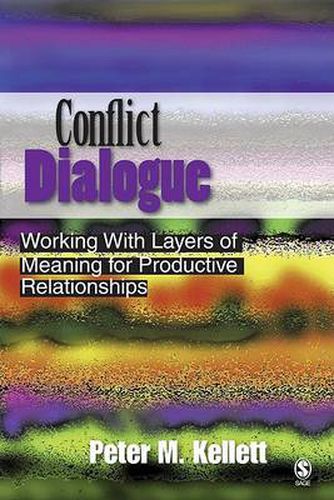Readings Newsletter
Become a Readings Member to make your shopping experience even easier.
Sign in or sign up for free!
You’re not far away from qualifying for FREE standard shipping within Australia
You’ve qualified for FREE standard shipping within Australia
The cart is loading…






Professor Kellett’s text is unique among undergraduate texts in its use of narrative theory to understand conflicts and to develop more effective strategies in family and relational conflicts. The most impressive aspect of the text is the rich and compelling stories. Students and practitioners will be able to relate to the stories and learn important conflict analysis techniques and communication skills through them.
-Angela Laird Brenton, University of Arkansas at Little Rock
The text is a wonderful study of the role of archetype in a conflict and the use of narrative. I am impressed with the notion of projection. In a self-focused society we don’t often think that the problem may lie within ourselves. The book teaches the skill of self-reflection and helps readers to become more other-centered. I am pleased to read the case studies as they provide fine classroom tools; they are engaging and diverse. Kellett has done much to incorporate narrative into the study of conflict and communication. Conflict Dialogue is a welcome addition to the body of conflict literature and centers communication within that body of literature.
-Christopher Lynch, Kean University
Conflicts are more effectively managed if people understand the layers meaning in their conflicts and collaborate based on those meanings. In this book, author Peter M. Kellett analyzes and interprets real-life conflict stories as a way to create opportunities for more productive ways to navigate and resolve conflict.
Key Features:
Examines real, lived experiences of conflict: Real-life conflict stories, from students themselves, illustrate how people actually manage conflict and allow readers to identify with experiences from their own lives. These stories represent the different participants in the conflict allowing readers to compare and contrast the meaning of the conflict from varied perspectives.
Addresses diversity in conflicts: Because conflicts are mediated by both personal and cultural issues of identity, case study narratives of diverse cultural relationships and conflicts are included throughout.
Blends theoretical depth with practical technique: This book uses an additive approach that builds theoretically grounded technique through four sections. Throughout each chapter, readers get both a sense of the depth and complexity of conflicts and an understanding how dialogic negotiation can be used to create more productive relationships.
Intended Audience:
This is an ideal textbook for advanced undergraduate and graduate courses such as Interpersonal Conflict, Conflict Analysis/Management, Dispute Resolution, and Negotiation in the fields of Communication, Sociology, Psychology, Human Resources, and Business & Management. It is also an excellent resource for scholars, researchers, and practitioners in the areas of conflict and dispute resolution.
$9.00 standard shipping within Australia
FREE standard shipping within Australia for orders over $100.00
Express & International shipping calculated at checkout
Professor Kellett’s text is unique among undergraduate texts in its use of narrative theory to understand conflicts and to develop more effective strategies in family and relational conflicts. The most impressive aspect of the text is the rich and compelling stories. Students and practitioners will be able to relate to the stories and learn important conflict analysis techniques and communication skills through them.
-Angela Laird Brenton, University of Arkansas at Little Rock
The text is a wonderful study of the role of archetype in a conflict and the use of narrative. I am impressed with the notion of projection. In a self-focused society we don’t often think that the problem may lie within ourselves. The book teaches the skill of self-reflection and helps readers to become more other-centered. I am pleased to read the case studies as they provide fine classroom tools; they are engaging and diverse. Kellett has done much to incorporate narrative into the study of conflict and communication. Conflict Dialogue is a welcome addition to the body of conflict literature and centers communication within that body of literature.
-Christopher Lynch, Kean University
Conflicts are more effectively managed if people understand the layers meaning in their conflicts and collaborate based on those meanings. In this book, author Peter M. Kellett analyzes and interprets real-life conflict stories as a way to create opportunities for more productive ways to navigate and resolve conflict.
Key Features:
Examines real, lived experiences of conflict: Real-life conflict stories, from students themselves, illustrate how people actually manage conflict and allow readers to identify with experiences from their own lives. These stories represent the different participants in the conflict allowing readers to compare and contrast the meaning of the conflict from varied perspectives.
Addresses diversity in conflicts: Because conflicts are mediated by both personal and cultural issues of identity, case study narratives of diverse cultural relationships and conflicts are included throughout.
Blends theoretical depth with practical technique: This book uses an additive approach that builds theoretically grounded technique through four sections. Throughout each chapter, readers get both a sense of the depth and complexity of conflicts and an understanding how dialogic negotiation can be used to create more productive relationships.
Intended Audience:
This is an ideal textbook for advanced undergraduate and graduate courses such as Interpersonal Conflict, Conflict Analysis/Management, Dispute Resolution, and Negotiation in the fields of Communication, Sociology, Psychology, Human Resources, and Business & Management. It is also an excellent resource for scholars, researchers, and practitioners in the areas of conflict and dispute resolution.